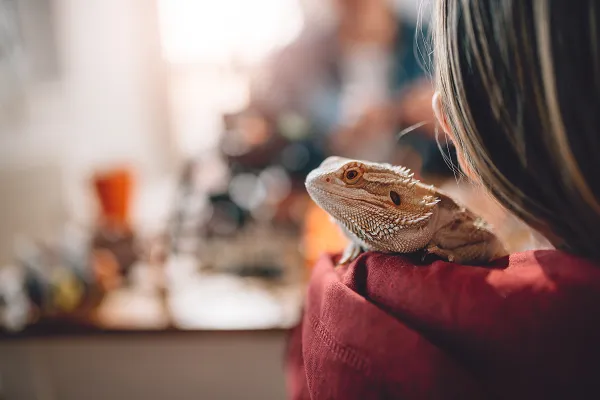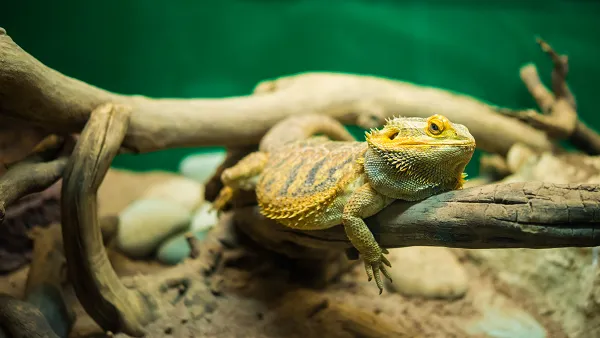Bearded Dragons – Owning

Bearded dragons are well-known small to medium-sized lizards. They are currently considered one of the most popular pet lizards for all ages. Owners often refer to their pets as ‘beardies’. This handout explains how they differ from other pets and provides tips for selecting a healthy beardie to keep as your pet.
Bearded Dragons – Housing

Bearded dragons have specific environmental requirements to thrive as our pets. This handout outlines their housing needs, including enclosure size, appropriate bedding, preferred accessories, and necessary lighting and temperature control.
Bearded Dragons – Diseases

If they are well looked after, including proper diet and husbandry, bearded dragons are reasonably hardy animals. Common health conditions of pet bearded dragons include CANV, atadenovirus, metabolic bone disease, parasites, infectious stomatitis (mouth rot), and respiratory infections. Any change from normal is cause for concern and should be immediately evaluated by your veterinarian.
Annual Veterinary Visit for Reptiles

Reptile pets benefit from yearly health examinations. Regular veterinary care, to prevent problems before they occur, is necessary to ensure your pet lives a long, healthy life. Intestinal parasites and/or underlying health problems may only be identified by your veterinarian during a yearly exam.
Common Diseases of Box Turtles

Turtles may be affected by any of the following conditions: metabolic bone disease (MBD), vitamin A deficiency, respiratory infections, abscesses, shell infections and fractures, and parasites. This article outlines typical signs and treatment for these common conditions. Seek immediate veterinary care if there is any deviation from normal in your pet turtle.
Common Diseases of Aquatic Turtles

Turtles may be affected by one of the following diseases: metabolic bone disease (MBD), vitamin A deficiency, respiratory diseases, abscesses, shell infections, shell fractures, and parasites. Improper diet, poor water filtration, and lack of UV light are contributing factors for many aquatic turtle diseases. Seek immediate veterinary care if your aquatic turtle shows any deviation from normal.
Allopurinol

Allopurinol is an oral medication typically used to prevent uric acid and calcium oxalate stones in dogs. It is also used off-label to treat leishmaniasis and gout in dogs and other species. Side effects are uncommon but may involve stomach upset. Caution must be taken when allopurinol is used in conjunction with certain other medications. It should not be used in pets with liver or kidney dysfunction or in red-tailed hawks.
Iguanas: Problems

Taking your pet to the vet can be a stressful experience, both for you and your furry friend. Pets often feel anxious due to unfamiliar environments, strange smells, and new faces. To ease this anxiety, start by familiarizing them with the car and the carrier well before the visit. Practice taking short, non-stressful car rides, and allow them to explore the carrier at home with treats or toys inside. You can also use calming sprays or treats to soothe their nerves on the day of the visit.
Common Problems in Aquatic Turtles

There are several problems that can occur in aquatic turtles. This handout discusses the most noted problems: calculi, tissue prolapses, irregular shell growth, shell fractures or trauma, algae on the shell, skin and shell sloughing, Salmonella infection that can be passed to humans, dystocia, and hibernation.
Box Turtles: Problems

Box turtles can be very fairly easy to care for type of turtle. It needs to be mentioned that there are several medical conditions that are known with box turtle ownership. Every box turtle owner should be aware that any swelling, change in energy level or food intake needs veterinary attention relatively soon.
